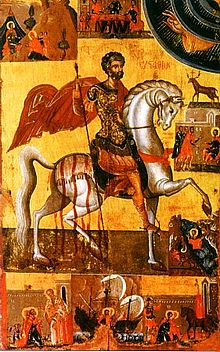Eustace and companions | |
|---|---|
 Greek Orthodox icon of St. Eustathios | |
| Martyr | |
| Died | 118 |
| Venerated in | Anglican Communion Roman Catholic Church Eastern Orthodox Church Oriental Orthodoxy |
| Canonized | Pre-Congregation |
| Feast | 20 September (Western Christianity, Byzantine Christianity) Thout 22 (Coptic Christianity) |
| Attributes | Christian Martyrdom, bull; crucifix; horn; stag; oven |
| Patronage | against fire; fire prevention; firefighters; hunters; hunting; huntsmen; trappers; against family discord; difficult situations; torture victims; Madrid |
Saint Eustace (Latinized Eustachius or Eustathius, Greek Εὐστάθιος Πλακίδας Eustathios Plakidas)[1] is revered as a Christian martyr. According to legend, he was martyred in AD 118, at the command of emperor Hadrian. Eustace was a pagan Roman general, who converted to Christianity after he had a vision of the cross while hunting. He lost all his wealth, was separated from his wife and sons, and went into exile in Egypt. Called back to lead the Roman army by emperor Trajan, Eustace was happily reunited with his family and restored to high social standing, but after the death of Trajan, he and his family were martyred under Hadrian for refusing to sacrifice to pagan Roman gods.
Eustace was venerated in the Byzantine Church from at least the 7th century. His veneration is attested for the Latin Church for the 8th century, but his rise to popularity in Western Europe happened in the high medieval period, during the 12th to 13th centuries. There are many versions and adaptations of his legend, in prose, in verse, and in the form of plays, in Latin, French and other languages. The saint, and scenes from his legend, were also frequently depicted in the figurative arts.[2]
His feast day, both in Eastern and Western tradition, is on 20 September. The Armenian Apostolic Church commemorates St. Eustace on 1 October.[3]
- ^ "Given name Eustace". Behind the Name. Retrieved October 29, 2015.
English form of EUSTACHIUS or EUSTATHIUS, two names of Greek origin which have been conflated in the post-classical period.
- ^ Hourihane 2002, p. 60.
- ^ LLC, Helix Consulting. "Armenian Church commemorates St. Eustatheos, his wife Theophista and others". www.panorama.am.